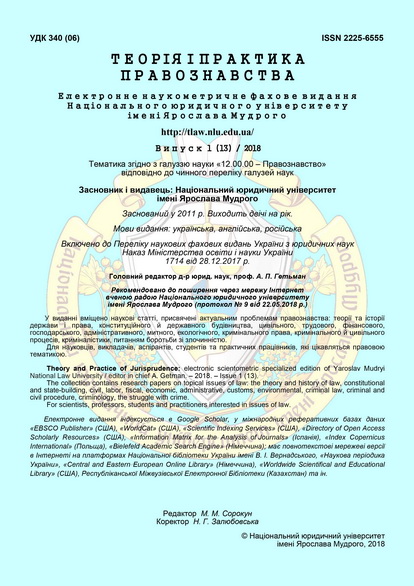Material benefit in civil law and tax legislation
DOI:
https://doi.org/10.21564/2225-6555.2018.13.126184Keywords:
оbjects of civil legal relations, benefits, material needs, intangible needs, motivationAbstract
The article is devoted to the study of the benefit as an object of civil, labor and tax legal relations. It identifies the conditions for assigning a subject to the category of goods. In order for any item to acquire signs of good, it is necessary to coincide with the following four conditions: 1) human needs; 2) the properties of the object, making it suitable for being put into a causal connection with the satisfaction of this need; 3) knowledge of the person of this causal connection; 4) the ability to dispose of the subject in such a way as to actually use it to meet this need. On the basis of this, it is proposed to supplement the Tax Code with a norm aimed at harmonizing different legislation. Subparagraph (b) of clause 164.2.17 of Article 164 of the Tax Code should be supplemented by the following paragraph: "In addition to the exceptions provided for in subparagraph (a) of this subparagraph, the additional benefit of the taxpayer shall not be considered as property, goods, goods, works, services which do not satisfy personal material and / or spiritual needs of the employee, regardless of the employee's awareness of the lack of such an opportunity to meet these needs".
Inclusion of such a paragraph would lead to harmonization of tax and civil and labor legislation, which would eliminate the basis for conflicts between taxpayers and controlling authorities over the interpretation of a particular object of legal relationship as a benefit received by an employee and, accordingly, taxable with personal incomes and military collections
References
Spasibo-Fateeva, I.V., Krat, V.I., Pechenyj, O.P. i dr. Khar'kovskaja civilisticheskaja shkola: ob'ekty grazhdanskih prav. I.V. Spasibo-Fateevа. (Ed.). (2015). Kharkіv: Pravo [in Russian].
Vakulina, G.A. (2009). O ponjatii ob'ekta grazhdanskogo pravootnoshenija. Sovremennye naukoemkie tehnologii, 4, 58–59 [in Russian].
Grazhdanskoe pravo. E.A. Suhanov (Ed.). (1998). (Vols. 1–4); Vol. 1.Moscow: BEK,. S. 295 [in Russian].
Spasybo-Fatieieva, I.V. (2010). Tsyvilnyi kodeks Ukrainy. Naukovo-praktychnyi komentar. Vol. 4. Kharkiv: Straid, 12 [in Ukrainian].
Tsyvilnyi kodeks Ukrainy. Naukovo-praktychnyi komentar. Vol. 4. I.V. Spasybo-Fatieieva. (Ed.). (2010). Kharkiv: Straid, 11 [in Ukrainian].
Podatkovyi kodeks Ukrainy. URL: http://zakon2.rada.gov.ua/laws/show/2755-17.
Menger, K. (1992). Osnovanija politicheskoj jekonomii. Avstrijskaja shkola v politicheskoj jekonomii. K. Menger, E. Bjom-Baverk, F. Vizer. (Eds.). Moscow: Jekonomika, 39–75 [in Russian].
Grazhdanskoe pravo. A.P. Sergeev, Ju.K. Tolstogoy. (Eds.). (1998). Ch.1. Moscow: Prospekt, 205 [in Russian].
Martyshin, O.V. (2004). Problema cennostej v teorii gosudarstva i prava. Gosudarstvo i pravo, 10, 5 [in Russian].
Kodeks zakoniv pro pratsiu Ukrainy vid 10.12.1971 r. № 322-VIII. Redaktsiia vid 20.01.2018 r. URL: http://zakon5.rada.gov.ua /laws/show/322-08.
Pro oplatu pratsi: Zakon Ukrainy vid 24.03.1995 № 108/95-VR. URL: http://zakon2. rada.gov.ua/laws/show/108/95-%D0%B2%D1%80.
Indyvidualna podatkova konsultatsiia vid 22.03.2017 r. № 5683/6/99-99-13-02-03-15. URL: http://www.visnuk.com.ua/ru/news/id/3070.
Indyvidualna podatkova konsultatsiia vid 19.10.2017 r. № 2300/6/99-99-13-02-03-15/IPK. URL: http://search.ligazakon.ua/l_doc2.nsf/link1/PK676.html.
Polozhennia (standart) bukhhalterskoho obliku 15 «Dokhid», zatverdzhene nakazom Ministerstva finansiv Ukrainy vid 29.11.1999 r. № 290, zareiestrovanym v Ministerstvi yustytsii Ukrainy 14.12.1999 r. za № 860/4153. URL: http://zakon3.rada.gov.ua/laws/show/z0860-99.
Tsyvilnyi kodeks Ukrainy. URL: http://zakon3.rada.gov.ua/laws/show/435-15
Downloads
Published
How to Cite
Issue
Section
License
Copyright (c) 2018 Theory and practice of jurisprudence

This work is licensed under a Creative Commons Attribution 4.0 International License.




